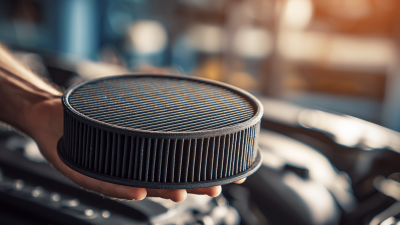Choosing the right vehicle filter is a crucial aspect of vehicle maintenance that often goes overlooked by many car owners. With a multitude of options available, ranging from air filters to oil filters and fuel filters, making the right choice can significantly impact your vehicle's performance, efficiency, and longevity. Understanding the specific needs of your vehicle is vital, as different filters serve distinct purposes and vary in quality and design.
This blog provides 15 essential tips to guide you in selecting the most appropriate vehicle filter for your needs. Whether you're a seasoned mechanic or a first-time car owner, our insights will equip you with the knowledge necessary to make informed decisions that enhance your vehicle's functionality while ensuring optimal protection against contaminants.

Dive in as we explore the key considerations that will help you choose the perfect filter tailored to your vehicle's requirements.
When it comes to maintaining a vehicle, selecting the right filters is essential for optimal performance. Vehicle filters play a significant role in ensuring that various systems function effectively, including the engine, air conditioning, and overall air quality inside the cabin. Understanding the different types of filters available, such as engine oil, air, fuel, and cabin filters, can help vehicle owners make informed decisions tailored to their specific needs. For instance, engine air filters prevent harmful debris from entering the engine, thereby enhancing efficiency and longevity. In contrast, cabin filters are crucial for maintaining a pleasant driving environment by filtering out pollutants and allergens from the air.
As the automotive filter market experiences remarkable growth, projected to reach a value of $32 billion by 2035, it is clear that vehicle owners are increasingly recognizing the importance of these components. With the rise of newer emissions standards, such as Euro 6 and beyond, the need for high-quality filters that comply with regulations has never been more critical. By considering factors like filter type, installation frequency, and vehicle usage, drivers can ensure they choose the right products that not only improve the vehicle's performance but also enhance their overall driving experience.
| Filter Type | Function | Replacement Frequency | Signs of Wear |
|---|---|---|---|
| Oil Filter | Removes contaminants from engine oil | Every 5,000-7,500 miles | Engine noise, reduced oil pressure |
| Air Filter | Filters air entering the engine | Every 15,000-30,000 miles | Decreased fuel efficiency, poor acceleration |
| Cabin Air Filter | Cleans the air inside the vehicle | Every 15,000-25,000 miles | Unpleasant odors, reduced airflow |
| Fuel Filter | Removes impurities from fuel | Every 20,000-40,000 miles | Engine stalling, poor acceleration |
| Transmission Filter | Keeps transmission fluid clean | Every 30,000-50,000 miles | Delayed shifting, slipping transmission |
 When it comes to selecting the right vehicle filter for your car, there are several key factors worth considering to ensure optimal performance and longevity. The global automotive filter market is projected to grow from an estimated USD 12 billion in 2023 to a compound annual growth rate (CAGR) of 4.16% from 2024 to 2031, highlighting the increasing importance of high-quality filters in vehicle maintenance. One crucial aspect is the type of filter you require, which may range from air and oil filters to fuel and cabin filters, each serving a specific purpose in enhancing vehicle efficiency and environmental compliance.
When it comes to selecting the right vehicle filter for your car, there are several key factors worth considering to ensure optimal performance and longevity. The global automotive filter market is projected to grow from an estimated USD 12 billion in 2023 to a compound annual growth rate (CAGR) of 4.16% from 2024 to 2031, highlighting the increasing importance of high-quality filters in vehicle maintenance. One crucial aspect is the type of filter you require, which may range from air and oil filters to fuel and cabin filters, each serving a specific purpose in enhancing vehicle efficiency and environmental compliance.
Another essential factor is the material and technology used in the filters. For instance, the cabin AC filters market is expected to expand from USD 10.84 billion in 2024 to USD 15.84 billion by 2033, growing at a rate of about 4.3%. Filters made from advanced materials can significantly enhance purification efficiency and reduce harmful emissions within the vehicle's cabin, contributing to a healthier driving experience. Thus, understanding your specific needs and the market trends can guide you towards selecting the right vehicle filter that meets both performance requirements and future regulatory standards.
When selecting a vehicle filter, understanding filter efficiency ratings is paramount. These ratings reveal how effectively a filter can remove contaminants from the air or fluids passing through it. For instance, HEPA filters can trap at least 99.97% of particles that are 0.3 microns or larger, making them a top choice for those prioritizing air quality. According to the Automotive Filter Market Report, filtration efficiency is a critical factor influencing consumer preferences and is expected to drive a significant portion of market growth in the coming years.

When considering the right vehicle filter, remember these tips: first, always check the manufacturer's specifications for your vehicle to ensure compatibility. Second, look for filters with performance certifications from recognized organizations, as these can assure you of their efficiency claims. Lastly, consider the type of driving you do—urban and highway driving may require different filtration needs, particularly for oil and air filters, to maintain engine health and performance.
Additionally, be aware that filters with higher efficiency may sometimes come with a higher cost, but investing in quality can lead to better engine protection and longevity. Research shows that proper filtration can improve fuel efficiency by up to 10%, ultimately saving you money in the long run. By understanding filter ratings and their significance, you can make informed choices that will benefit both your vehicle's performance and your wallet.
When selecting vehicle filters, maintenance and cost are two critical factors that can significantly influence your decision. Regular maintenance is essential for ensuring your vehicle runs smoothly and efficiently. Filters, whether for oil, air, fuel, or cabin, play a vital role in protecting your engine and enhancing performance. Neglecting to change filters at recommended intervals can lead to decreased efficiency and potential damage, ultimately resulting in higher repair costs down the line. Therefore, understanding the maintenance requirements of different filters can help you avoid unexpected expenditures and maintain your vehicle's longevity.
Cost is another important consideration when choosing vehicle filters. While some filters may have a lower upfront cost, it's essential to evaluate their lifespan and effectiveness. Investing in higher-quality filters can often save you money in the long run by reducing wear and tear on engine components and improving fuel efficiency. Additionally, consider the availability of replacement filters and whether they align with your budget. By balancing maintenance needs with cost, you can make an informed decision that ensures your vehicle operates optimally without breaking the bank.
This chart illustrates the average maintenance costs and lifespan of different types of vehicle filters, helping you make an informed decision when selecting the right filter for your vehicle.
When it comes to maintaining your vehicle, paying attention to filter performance is critical. Filters play vital roles in ensuring your engine runs efficiently and your cabin remains clean. Recognizing the signs of filter failure can prevent extensive damage to your vehicle and costly repairs. According to the Automotive Aftermarket Industry Association, nearly 30% of vehicles on the road have one or more filters that need replacing. Signs of filter failure often manifest as unusual noises from the engine, a decrease in fuel efficiency, or the presence of dust and debris in the cabin air.
For instance, a dirty air filter can restrict airflow, causing an engine to work harder, which can lead to a 10% decrease in fuel efficiency. The same applies to oil filters; failing to replace them can result in engine wear and tear, accelerating the need for costly repairs. Data from the Car Care Council indicates that 50% of drivers neglect basic vehicle maintenance, often overlooking vital filter swaps. Vigilantly monitoring your vehicle's performance and being alert to these symptoms is essential for ensuring your filters are functioning optimally and extending your vehicle's lifespan.






